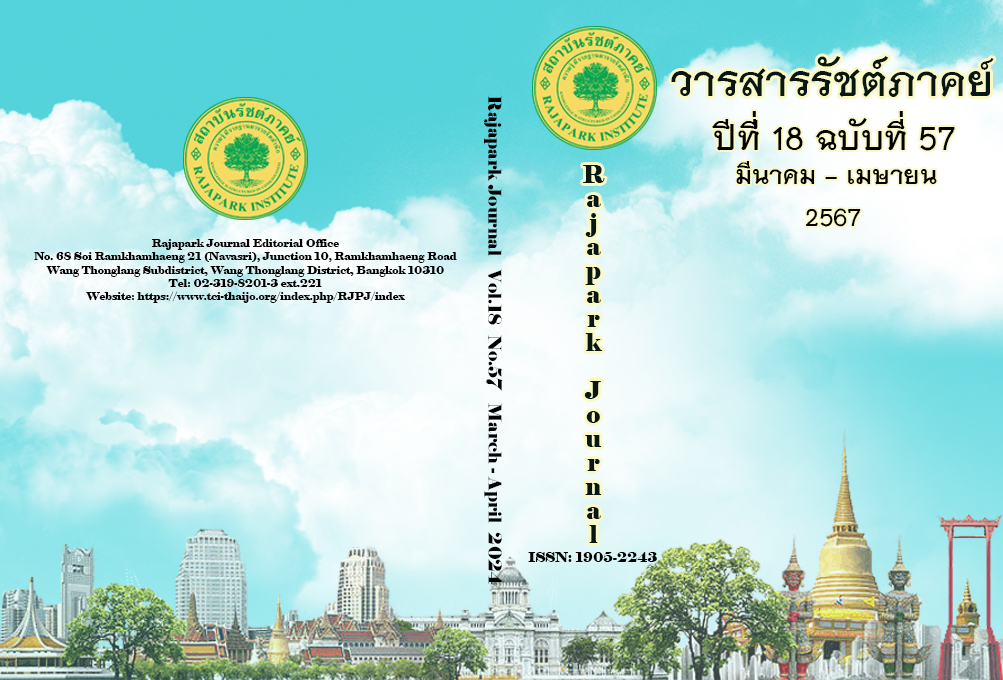Corporate Social Responsibility of Environmental and Corporate Governance Towards the Operating Results of ESG100 Groups
Main Article Content
Abstract
The purpose of this research was to study the relationship between corporate social responsibility (CSR) on the environment and corporate governance towards the return on total assets (ROA), the return on equity (ROE), the net profit margin (NPM), and the gross profit margin (GPM). To collect data between 2017 and 2021 on 48 companies listed on the Stock Exchange of Thailand that were related to the energy and utilities sectors. and the data was analyzed using descriptive statistics such as frequency, percentage, mean, and standard deviation. Likewise, inferential statistics, including Pearson’s correlation analysis and multiple regression analysis, were used in this research as well. The results of the research were 1) and 3) corporate governance assessment results of listed companies (CGR), being ranked in the ESG 100 (ESG), being selected to be listed in the Thailand Sustainability Index (THIS), and receiving sustainability awards for the disclosure of corporate governance. ESG information and CSR positively correlate with performance. The variables selected for the Dow Jones Sustainability Index (DJSI) correlate negatively with the operating results: 2) Corporate Governance Assessment Results of Listed Companies (CGR) Ranking in the ESG 100 (ESG) Inclusion in the Thailand Sustainability Index (THIS). The variables of receiving sustainability awards for ESG disclosure (CSR) and being selected for the Dow Jones Sustainability Index (DJSI) are negatively correlated with the operating results; 4) positive factors for ESG 100 (ESG), being selected for the Thailand Sustainability Index (THIS), receiving the Sustainability Award for ESG Disclosure (CSR), and being selected to be listed in the Dow Jones Sustainability Index (DJSI) are negatively correlated with performance.
Article Details

This work is licensed under a Creative Commons Attribution-NonCommercial-NoDerivatives 4.0 International License.
Views and opinions appearing in the Journal it is the responsibility of the author of the article, and does not constitute the view and responsibility of the editorial team.
References
Bank of Thailand. (2021). Report on Direct Investment in Foreign Countries. https://www.bot.or.th
Berghe, L., & Louche, C. (2005). The Link Between Corporate Governance and Corporate Social Responsibility in Insurance. The Geneva Papers on Risk and Insurance-Issues and Practice, 30, 425-442. https://link.springer.com/article/10.1057/palgrave.gpp.2510034
Chongruksut, W. (2018). Social and Environmental Disclosure Based on GRI Guideline: A Case Study of Firms Listed on the Stock Exchange of Thailand in the SET 100 Index Group. Kasetsart Applied Business Journal, 12(17), 1-22. https://so04.tci-thaijo.org/index.php/KAB/article/view/167953
Damchu, L., & Rungruang, P. (2020). Relationship Between Operating Efficiency and Business Value of Companies Listed on the Stock Exchange of Thailand Industrial Goods. In The 16th National Social Science Conference (pp. 572-583). Chiang Rai Rajabhat University.
Ergin, E. (2012). Corporate Governance Ratings and Market-based Financial Performance: Evidence from Turkey. International Journal of Economics and Finance, 4(9). DOI:10.5539/ijef.v4n9p61
Jensen, M.C., & Meckling, W.H. (1976). Theory of the Firm: Managerial Behavior, Agency Costs and Ownership Structure. Journal of Financial Economics, 3(4), 305-360. https://doi.org/10.1016/0304-405X(76)90026-X
Koundouri, P., Pittis, N., & Plataniotis, A. (2022). The Impact of ESG Performance on the Financial Performance of European Area Companies: An Empirical Examination. Environmental Sciences Proceedings, 15(1), 13. https://doi.org/10.3390/environsciproc2022015013
Kula, V., & Baykut, E. (2015). Does Better Corporate Governance Rating Lead to Higher Market Value? An Empirical Investigation of Bist Xkury Listed Companies. Ejovoc (Electronic Journal of Vocational Colleges), 5(7), 30-43.
Kumar, P., & Firoz, M. (2022). Does Accounting-based Financial Performance Value Environmental, Social and Governance (ESG) Disclosures? A detailed note on a corporate sustainability perspective. Australasian Accounting Business & Finance Journal, 16(1), 41–72. DOI: 10.14453/aabfj.v16i1.4
Loh, L., Thomas, T., & Wang, Y. (2017). Sustainability Reporting and Firm Value: Evidence from Singapore-Listed Companies. Sustainability, 9(11), 2112. https://doi.org/10.3390/su9112112
Petchseesuk, P. (2022, June 3). “ESG” Sustainability Concept That Organizations Should Use as a Tool or Just Following the Trend. National Innovation Agency (Public Organization). https://www.nia.or.th/ESG-sustainability-concepts-or-trends
Phondet, P. (2020). Corporate Governance Intellectual Capital and Performance of Listed Companies on the Stock Exchange of Thailand[Master’s Thesis, Maejo University]. http://10.1.245.54/dspace/handle/123456789/365
Pinkaew, W., & Channgam, J. (2022). The Relation Between Corporate Governance and Corporate Characteristics Affects the Profitability of Companies Listed on The Company on The Stock Exchange of Thailand (SET 100). Western University Research Journal of Humanities and Social Science, 8(2), 155-170. https://so04.tci-thaijo.org/index.php/WTURJ/article/view/259499
Promlao, K. (2021, May). Concept ESG What is it and Why is it Popular Among Investors Today?. TRIS CORP. https://www.tris.co.th/esg/
Stock Exchange of Thailand. (2017). Corporate Governance Code for Listed Companies in 2017. https://www.sec.or.th/cgthailand/TH/Documents/Regulation/CGCode.pdf
Thongsaichon, N. (2022, August 15). ESG Investing in the Modern World. SETinvestnow. https://www.setinvestnow.com/th/knowledge/article/165-tsi-invest-in-esg-stocks-in-new-investment-era
Van der Zahn, J.-L.W.M. (2023). Sustainability Reporting Regime Transition and the Impact on Intellectual Capital Reporting. Journal of Applied Accounting Research, 24(3), 544-582. https://doi.org/10.1108/JAAR-06-2021-0143
Yilmaz, I. (2018). Corporate Governance and Financial Performance Relationship: Case for Oman Companies. Journal of Accounting Finance and Auditing Studies, 4(4), 84-106. DOI:10.32602/jafas.2018.006


